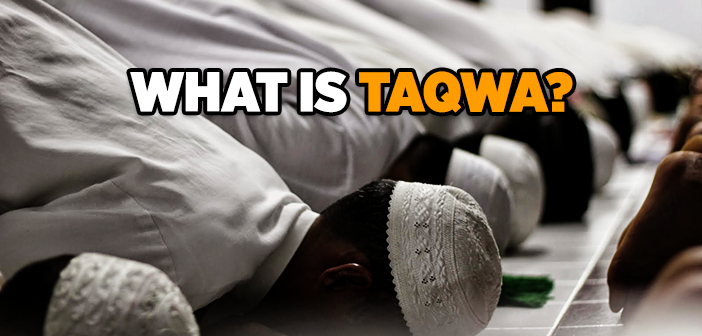
What is Taqwa?
What is taqwa? What is taqwa meaning?
All virtues in Islam commence from taqwa, which is to have consciousness of Allah, may He be glorified and exalted, love Him and His Prophet Muhammad (peace and blessings be upon him) and have fear of Allah. In the Qur’an, those who believe and perform good deeds are described as ‘muttaqi’ (pious). The most precious people in the eyes of God are the muttaqi.[1] Allah is with those who are pious and with the people who do good deeds.[2] Allah says; “Goodness (taqwa) does not consist in turning your face towards East or West. The truly good are those who believe in God and the Last Day, in the angels, the Scripture, and the Prophets; who give away some of their wealth, however much they cherish it, to their relatives, to orphans, the needy, travelers and beggars, and to liberate those in bondage; those who keep up the prayer and pay the prescribed alms; who keep pledges whenever they make them; who are steadfast in misfortune, adversity, and times of danger. These are the ones who are true, and it is they who are aware of God.”[3] The Messenger of Allah (peace and blessings be upon him) emphasized that a believer needs to uphold taqwa in every condition, he said; “Have taqwa of Allah wherever you are, and follow an evil deed with a good one to wipe it out, and treat the people with good manners.”[4] It is important for the new Muslim to understand that the respect and the obedience of God, based on fear only is not recognized in Islam, since the love of Allah is always prioritized over the fear of Allah, may He be glorified and exalted. The understanding of the term, ‘fear of Allah’, which is often incorrectly translated as the only meaning of taqwa, should be recognized to mean, to shy away from sinning and violating God’s commands, as well as, being genuinely perturbed about being shamed on the Day of Judgment. The rationale behind this principle is to guide Muslims to able to obey God out of their intense love for Him and the immense desire to earn His Pleasure. In other words, to have the wish to obey Him because they want to, and not only because they have to, out of fear of His Wrath and punishment. It is important to know that while delivering his message, the Prophet always approached people with love and affection, rather than, with a strict and daunting attitude.[5]
To achieve taqwa is the definite way to overcome all kinds of hardships in this world and the world to come.[6] Regarding religious issues, a Muslim should look towards the ones who are better than him or her, and strive to do even better; and regarding worldly blessings, a Muslim should look to those who have less than him or her and be thankful to Allah. According to the Prophet, these are the characteristics of a “thankful and patient believer.” A pious person takes the following command to heart; “Help one another to do what is right and good; do not help one another towards sin and hostility.”[7] Being aware of one’s own weaknesses and sins, and asking for forgiveness from both people and Allah, may He be glorified and exalted, are qualities of a pious human being. It is reported in one hadith that one of the Companions of the Prophet, Hanzala, developed an apprehension concerning himself; he observed that while he was in company of the Prophet, he was positively influenced by the Prophet’s (peace and blessings be upon him), in such a way that he felt immediately the blessings of heaven and the fear of the torments of hell. However, when he returned home, and partook in his daily activities, he was unable to call to mind these important issues and feelings. Hanzala felt that his behavior was hypocritical and consulted the Prophet. The Prophet consoled him and said; “If you were to abide in the state that you are in when you are with me, then the Angels would shake hands with you in your gatherings, and upon your bedding, and in your paths. However, O Hanzala! There is a time for this and a time for that.”[8]
Here it is apt to inform the new Muslim that a misconception regarding religious life is to envision taqwa as, either an unattainable state, or to idealize it too much. It is not appropriate to consider that taqwa will make life more difficult for oneself, or to idealize the attainment of taqwa in such a way as to not consider the material and the spiritual capacity of oneself as a human being. The Prophet always asked his companions to do things in moderation and to not exceed their capacity. Prophet Muhammad (peace and blessings be upon him) said; “Abstinence in the world is not, by prohibiting (oneself) the lawful nor by neglecting wealth. Instead abstinence in the world is that you do not hold more firmly to what is in your hand than to what is in the hand of God, and that you be more hopeful of the rewards that come with an affliction that you may suffer if it remains with you.”[9] The Prophet did not live his life in seclusion, but at the same time, he did not lose himself in worldly affairs as well. In his Last Sermon, the Prophet proclaimed that the Arabs did not have any superiority over non-Arabs, non-Arabs over Arabs, white people over black people, and black people over white people, except in the matter of taqwa.[10]
One day, the Prophet met a group of his companions. They told him; “We see you are very content today.” Upon this, the Prophet said; “Yes, alhamdulillah.” When the companions began to speak about wealth, the Prophet said; “There is nothing wrong for a pious person being rich, but for him, health is better than wealth, and spiritual contention is better than worldly blessings.”[11] When the Prophet was once asked the main reason for why people were admitted to Paradise, he replied; “Taqwa and good character.”[12] Allah says in the Qur’an; “You who believe, be mindful of Allah, as is His due, and make sure you devote yourselves to Him, to your dying moment. Hold fast to God’s rope all together; do not split into factions. Remember Allah’s favor to you: you were enemies and then He brought your hearts together and you became brothers by His grace; you were about to fall into a pit of Fire and He saved you from it– in this way Allah makes His revelations clear to you so that you may be rightly guided.”[13]
[1]Q. 49:13[2].Q. 16:128.[3]Q. 2:177.[4]. Sunan al-Tirmidhī, al-Birr, 55.[5].Q. 3:159.[6]. Sunan Ibn Maja, al-Zuhd, 24.[7]. Q. 5:2.[8].Sahih Muslim, al-Tawba, 12.[9].Sunan al-Tirmidhī, al-Zuhd, 29.[10]. Ibn Hanbal, 5, 411.[11]. Ibn Hanbal, V, 372.[12]. Sunan al-Tirmidhī, al-Birr, 62; Sunan Ibn Maja, al-Zuhd, 29.[13]. Q. 3:102-104.
Source: Islam For New Muslims An Educational Guide,Assoc. Prof. Amjad M. Hussain, Erkam Publications
Reverting to Islam

What is Islam?












